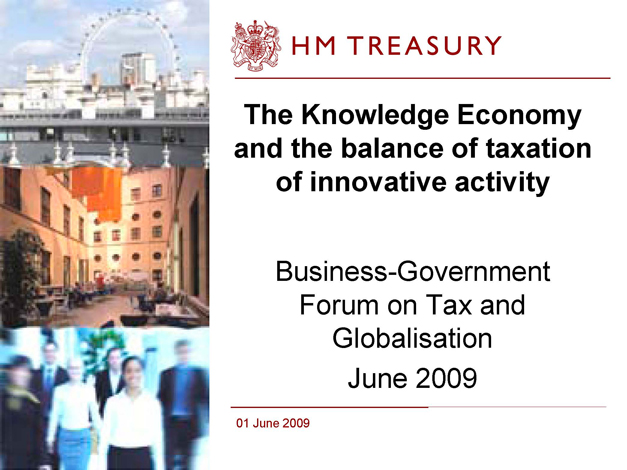Business-Government Forum on Tax and Globalisation 2009
- 10 pages
- Restricted: Budget
- June 1, 2009
1. What activities are we trying to encourage?
- Activities that contribute to UK productivity and employment
- Innovative activities that contribute to a “knowledge economy”
- High value-added activities that support productivity growth
- Multinational groups locating these activities in the UK
- Activities in which the UK has a comparative advantage
- ‘Intangible’ investment in the UK is estimated to be greater than investment in tangible assets
1. What activities are we trying to encourage?(Cont.)
Questions for discussion:
- Are some sectors more innovation-intensive than others?
- How do multinational businesses arrange global value chains –what is the role of innovative activity?
- Are some sorts of innovative activity more productive than others?
- Are some stages of the global value chain more value-adding than others?
2. What role does tax play in competitiveness?
- Evidence suggests a range of factors at play when investment location decisions are taken, tax is not the most important.
- For innovative activity, the availability of a skilled workforce, a broader science base and the ability to protect innovations are key
- Tax is a cost factor. Impacts on post-tax investment returns.
- The administration of tax is important, where perceptions of stability, certainty and transparency play a role
- What factors affect investment location decisions? Are these factors different for innovative activities?
- What factors determine whether the value chain –R & D, manufacturing or other activity –takes place in a single or multiple locations?
- When does tax enter group decision processes?
- How does tax impact on investment location decisions?
- What types of activities does tax play a more significant role in?
3. How does the UK support innovation?
- UK Government deploys a range of instruments to encourage investment in innovation, at national and regional level
- Some of these are delivered through the tax system -international comparisons suggest the UK is relatively generous compared to G7
- Key mechanism in tax system is R & D tax credit, considered successful at stimulating R & D, particularly among SMEs
- Corporate tax system also gives relief for intangible investment
Questions for discussion:
- How does the balance of taxation in the UK compare with competitor countries?
- What are the UK’s key non-tax strengths / weaknesses?
- How effective is the tax system at targeting support at innovative activities?
- If there are lessons to be learned from elsewhere, how could the taxation of innovative activity be rebalanced?
4. Future process and stakeholder engagement
- Important to understand how potential reforms would impact across all sectors, and the trade-offs inherent in these decisions
- Govt committed to involve interested parties from a wide range of businesses to build our evidence base
- Work closely with businesses to gather evidence on the role of tax in encouraging innovative activity. This will involve:
- Bilateral discussions with a range of businesses
- Wider engagement through workshops / seminars on tax and innovation
- Commitment to set out Govt’s approach before PBR. Subject to timing, report back to Multinational Forum at next meeting

